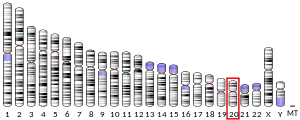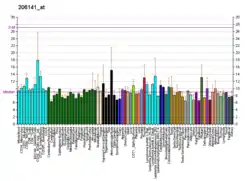MOCS3
Adenylyltransferase and sulfurtransferase MOCS3 is an enzyme that in humans is encoded by the MOCS3 gene.[5][6]
Molybdenum cofactor (MoCo) is necessary for the function of all molybdoenzymes. One of the enzymes required for the biosynthesis of MoCo is molybdopterin synthase (MPT synthase, encoded by MOCS2/Mocs2 in mammals). The protein encoded by this gene adenylates and activates MPT synthase. This gene contains no introns. A pseudogene of this gene is present on chromosome 14.[6]
References
- GRCh38: Ensembl release 89: ENSG00000124217 - Ensembl, May 2017
- GRCm38: Ensembl release 89: ENSMUSG00000074576 - Ensembl, May 2017
- "Human PubMed Reference:". National Center for Biotechnology Information, U.S. National Library of Medicine.
- "Mouse PubMed Reference:". National Center for Biotechnology Information, U.S. National Library of Medicine.
- Matthies A, Nimtz M, Leimkuhler S (May 2005). "Molybdenum cofactor biosynthesis in humans: identification of a persulfide group in the rhodanese-like domain of MOCS3 by mass spectrometry". Biochemistry. 44 (21): 7912–20. doi:10.1021/bi0503448. PMID 15910006.
- "Entrez Gene: MOCS3 molybdenum cofactor synthesis 3".
Further reading
- Reiss J, Johnson JL (2003). "Mutations in the molybdenum cofactor biosynthetic genes MOCS1, MOCS2, and GEPH". Hum. Mutat. 21 (6): 569–76. doi:10.1002/humu.10223. PMID 12754701. S2CID 41013043.
- Johnson JL, Coyne KE, Rajagopalan KV, et al. (2002). "Molybdopterin synthase mutations in a mild case of molybdenum cofactor deficiency". Am. J. Med. Genet. 104 (2): 169–73. doi:10.1002/1096-8628(20011122)104:2<169::AID-AJMG1603>3.0.CO;2-8. PMID 11746050.
- Deloukas P, Matthews LH, Ashurst J, et al. (2002). "The DNA sequence and comparative analysis of human chromosome 20". Nature. 414 (6866): 865–71. Bibcode:2001Natur.414..865D. doi:10.1038/414865a. PMID 11780052.
- Cortese MS, Caplan AB, Crawford RL (2003). "Structural, functional, and evolutionary analysis of moeZ, a gene encoding an enzyme required for the synthesis of the Pseudomonas metabolite, pyridine-2,6-bis(thiocarboxylic acid)". BMC Evol. Biol. 2: 8. doi:10.1186/1471-2148-2-8. PMC 115864. PMID 11972321.
- Strausberg RL, Feingold EA, Grouse LH, et al. (2003). "Generation and initial analysis of more than 15,000 full-length human and mouse cDNA sequences". Proc. Natl. Acad. Sci. U.S.A. 99 (26): 16899–903. Bibcode:2002PNAS...9916899M. doi:10.1073/pnas.242603899. PMC 139241. PMID 12477932.
- Matthies A, Rajagopalan KV, Mendel RR, Leimkühler S (2004). "Evidence for the physiological role of a rhodanese-like protein for the biosynthesis of the molybdenum cofactor in humans". Proc. Natl. Acad. Sci. U.S.A. 101 (16): 5946–51. Bibcode:2004PNAS..101.5946M. doi:10.1073/pnas.0308191101. PMC 395903. PMID 15073332.
- Lehner B, Sanderson CM (2004). "A protein interaction framework for human mRNA degradation". Genome Res. 14 (7): 1315–23. doi:10.1101/gr.2122004. PMC 442147. PMID 15231747.
- Gerhard DS, Wagner L, Feingold EA, et al. (2004). "The status, quality, and expansion of the NIH full-length cDNA project: the Mammalian Gene Collection (MGC)". Genome Res. 14 (10B): 2121–7. doi:10.1101/gr.2596504. PMC 528928. PMID 15489334.
- Rual JF, Venkatesan K, Hao T, et al. (2005). "Towards a proteome-scale map of the human protein-protein interaction network". Nature. 437 (7062): 1173–8. Bibcode:2005Natur.437.1173R. doi:10.1038/nature04209. PMID 16189514. S2CID 4427026.
- Krepinsky K, Leimkühler S (2007). "Site-directed mutagenesis of the active site loop of the rhodanese-like domain of the human molybdopterin synthase sulfurase MOCS3. Major differences in substrate specificity between eukaryotic and bacterial homologs". FEBS J. 274 (11): 2778–87. doi:10.1111/j.1742-4658.2007.05811.x. PMID 17459099. S2CID 82541137.
This article is issued from Wikipedia. The text is licensed under Creative Commons - Attribution - Sharealike. Additional terms may apply for the media files.




